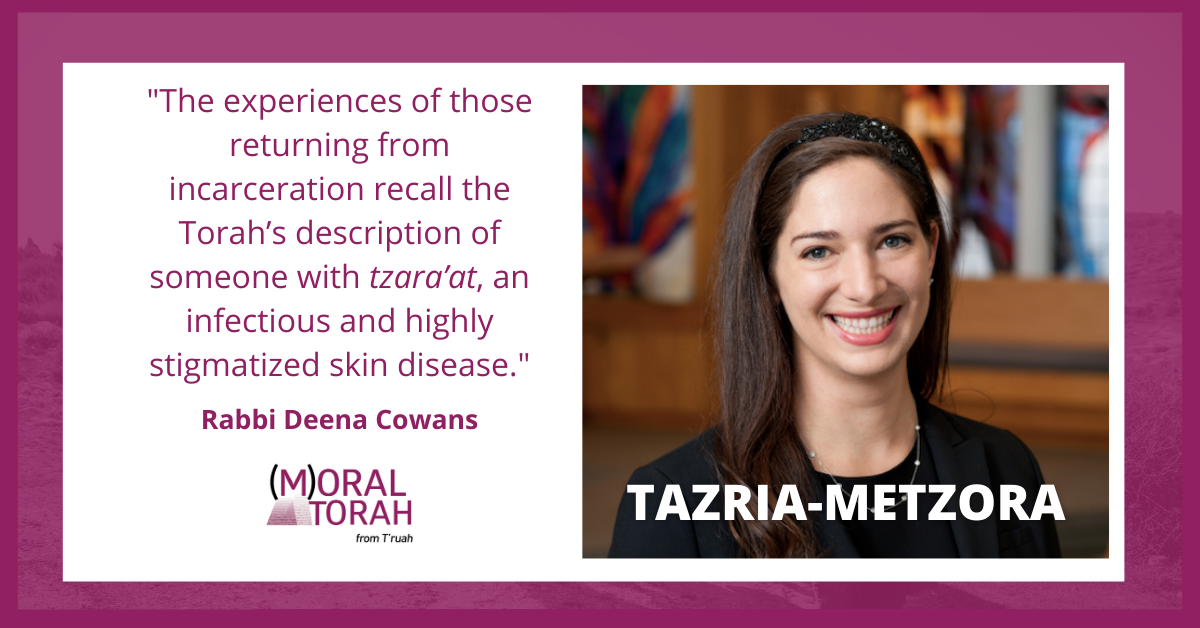A D’var Torah for Parshat Tazria-Metzora by Rabbi Deena Cowans
A few years ago, I worked as a prison-reentry chaplain in East Harlem. One day, I was sitting with the weekly spirituality group at the Wellness Center, an outpatient addiction treatment center connected to the re-entry facility. The group got to talking about freedom, a hot topic for people who had, until recently, been incarcerated and were now on parole.
“What makes you feel free, or not free?” I asked them.
Many of them chimed in with similar answers about restrictive parole stipulations and trouble finding a job hampering their feeling of freedom, while autonomy to choose their sleep schedule, clothing, and food helped them feel free.
Then one man, whom I’ll call Matthew, piped up.
“I’m all about freedom. When I first came home, I kept getting up every night at 3am to make myself a sandwich — just because I could. But now, I’m wondering if I will ever really be free. Everywhere I go, I gotta watch out for the cops, because I can get thrown back in jail just for being in the wrong place at the wrong time. And every time I go on a job interview, I get rejected because of my incarceration history. My family won’t even talk to me because they assume I’m just gonna get thrown in jail any day now. I’m out there trying to be better, and it feels like I’ll always just seem like another Black drug dealer, no matter what.”
Sign up to receive Moral Torah in your inbox each week.
The rest of the men echoed Matthew’s frustration: They felt changed, and wanted to change, but they see their histories as a mark they will wear forever.
The experiences of those returning from incarceration recall the Torah’s description of someone with tzara’at, an infectious and highly stigmatized skin disease.
This week, in Parshat Tazria-Metzora, we read about all sorts of afflictions that cause impurity and require a person to be quarantined from the community. Even after the proscribed time and rituals of purification have been completed, the person who was separated re-enters society a marked person, literally and figuratively. Their heads are shaven and they have to burn their old clothes, marking them even after they return.
The rabbis interpret tzara’at as a reflection of some inner sinfulness or wrongdoing; a person with tzara’at is not just shamed for their physical illness, but for their presumed personal shortcomings. They are forced into isolation, carefully monitored by the priests, and forced to leave the camp and live apart from others, only allowed back in after they have “served time.”
With the rise of mass incarceration, we are increasingly casting out entire segments of the population and hiding them away in jails and prisons. These people re-enter society with their records marred by their incarceration histories, and they can be prevented from accessing housing, jobs, and social services.
Find more commentaries on Tazria-Metzora.
Instead of pushing people away, as the Torah suggests, later Jewish tradition teaches us to turn our attention, love, and care to people on the fringes. There is a story in the Talmud (Sanhedrin 98a), of a rabbi who meets Elijah the Prophet, that I find particularly instructive.
“When will the Messiah come?” the rabbi asks Elijah.
“Go ask him yourself,” says Elijah.
“And where will I find him?” asks the rabbi.
“He sits at the gates of Rome, among the poor and the lepers.”
“How will I recognize him?” asks the rabbi.
“Like this,” says Elijah: “All the other lepers undo and retie all the bandages at once, but he does it one at a time.”
I love this story for two reasons.
First, it clearly tells us that we should not avoid the people at our margins — if the Messiah can sit among them, all the more so we should occupy ourselves with their concerns. But I also love that the story leaves it unclear whether the Messiah is tying his own bandages, or the bandages of others. Perhaps the Messiah is a leper himself, or perhaps he is out there caring for the marginalized.
Both of these reasons should compel us towards justice. Sitting with those who have been marginalized, and fighting for their inclusion, is a holy task, and each one of us knows what it is like to be marginalized for something.
 Spending my time with people at the margins, as a chaplain and a rabbi, forced me to confront my own marginalization — the ways I feel unseen, judged, alone, and scared. It allowed me to consider freedom, hope, optimism, and love. The written Torah this week shows us one way of policing society; our rabbis’ subsequent interpretation shows us how we can do better, to continue to include people at the margins instead of pushing them off to the side.
Spending my time with people at the margins, as a chaplain and a rabbi, forced me to confront my own marginalization — the ways I feel unseen, judged, alone, and scared. It allowed me to consider freedom, hope, optimism, and love. The written Torah this week shows us one way of policing society; our rabbis’ subsequent interpretation shows us how we can do better, to continue to include people at the margins instead of pushing them off to the side.
Rabbi Deena Cowans is the Associate Rabbi at Mishkan Chicago. She was ordained by the Jewish Theological Seminary of America, and holds an MPA in Development Practice from Columbia University.


